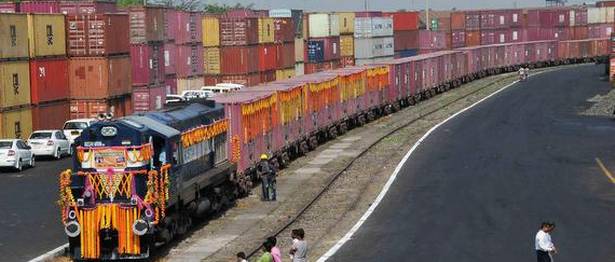Container Corporation of India Ltd (Concor) paid about Rs 600 crore to the Railways Ministry on Wednesday as land licence fee (LLF) for FY21, about 4.5 times more than the Rs 140 crore it paid in the previous year for running terminals built on land leased from the Indian Railways.
The LLF issue has literally derailed plans to privatise the state-run rail hauler of containers.
The steep outgo on LLF will dent Concor’s margins and profitability for FY21, further impacting its share price and valuation as the Cabinet looks set to consider a proposal piloted by the Railways Ministry to resolve the vexed land licence issue to help the Department of Investment and Public Asset Management (DIPAM) start the process for the sale of the inter-modal operator.
“The Rs 600-crore land licence fee has burnt a big hole in Concor’s pocket,” said a government official briefed on the development.
In its desperation to milch the maximum from its cash cow PSU in what could be its last year as a state-run entity, the cash-strapped Railways Ministry had raised a demand for about Rs 600 crore as LLF in the last week of FY21.
While doing so, the Ministry had disregarded its own circular issued last year, revising the method of calculating the LLF.
Beginning April 1, 2020, the Ministry decided to charge the annual LLF from Concor at the rate of 6 per cent of the industrial land value per acre where the terminal is located, which will increase by 7 per cent annually.
Till FY20, the LLF for the land leased from Indian Railways was paid by Concor on a per container basis that rose annually in tandem with the percentage increase in net profit of the company. In FY20, the LLF was billed at the rate of Rs 1,175 per twenty-foot equivalent unit (TEU).
The revised mode of collecting LLF from April 1, 2020 was expected to increase Concor’s pay-out on this count to about Rs 450 crore from Rs 140 crore in FY20.
“For some terminals, the Ministry worked out the LLF at the rate of 6 per cent of the industrial land value, while for others it stuck to the per container calculation,” the official said.
To reduce the higher overall license fee outgo, Concor had surrendered 16 terminals built on Indian Railways land since April 2020.
Concor currently runs 64 inland container depots (ICDs) of which it has to pay LLF for 25 terminals because they are built on land leased from Indian Railways.
As Concor leased land from the Indian Railways at concessional rates, it stoked fears among private container train operators that the new private owner of Concor would gain undue benefit from buying Concor apart from helping it become a dominant player as well as a private monopoly.
In comparison, terminals run by private container train operators are mostly built on land purchased at market rates.
According to the Cabinet proposal, the Railways Ministry will levy the LLF at the rate of 3 per cent of the industrial land value per acre where the terminal is located.
But, this also is not acceptable to private container train operators who fear that it will create a “state supported dominant private player in the intermodal sector, which will be against the interest of free and fair competition”.
“Any change in policy going forward that benefits Concor commercially without first addressing the issue of concessional land having been made available to Concor will not only be a clear violation of the concession agreements (signed between the Railways and private container train operators in 2006) but will also create a de-facto situation where preferential treatment would be received by the potentially successful private bidder for Concor,” Manish Puri, President, Association of Container Train Operators (ACTO), wrote in a February 5 letter to Prime Minister Narendra Modi.
The privatisation exercise, according to ACTO, should be undertaken in a manner that “first addresses this important issue rather than proceed toward what we fear could be the creation of a market disruptive force if a commercially dominant organisation such as Concor is transferred to entirely private management under a concessional pricing regime”.
Source : The Hindu Businessline








